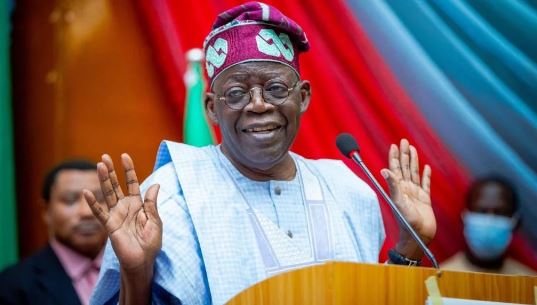President Bola Tinubu to Finance 2024 Budget with N7.8 Trillion Borrowing

President Bola Tinubu to Finance 2024 Budget with N7.8 Trillion Borrowing, as he presents his inaugural budget to the National Assembly, Tinubu expressed confidence in an anticipated economic growth of 3.7 percent for the nation, surpassing the global projection of 3.0 percent.
Tinubu highlighted that the government had recorded revenue inflows of N8.6 trillion by September 2023. Despite this achievement, he acknowledged the shortfall, affirming the government’s steadfast commitment to fulfilling its obligations to the people.
In an effort to streamline funding for education, Tinubu revealed intentions to explore more sustainable approaches, including the introduction of student loans from January 2024. Additionally, he pledged to address pertinent issues currently facing the nation.
Seeking the collaboration of lawmakers, the President urged a meticulous review of the budget estimates, emphasizing the importance of approving projects aligned with the government’s mandate.
Details about President Bola Tinubu to finance 2024 budget with N7.8 trillion borrowing plans will be disclosed shortly, fostering an ongoing discussion about the economic strategies laid out for Nigeria’s future.
President Bola Tinubu budget on Nigeria Economy
The decision to finance the 2024 budget through substantial borrowing, as proposed by President Bola Tinubu, carries both potential opportunities and challenges for Nigeria’s economy.

Opportunities:
Investment in Development: The infusion of borrowed funds could be directed toward critical sectors like infrastructure, education, healthcare, and technology. This investment may stimulate economic growth, create job opportunities, and improve living standards for citizens.
Economic Expansion: If utilized effectively, borrowed funds might spur economic expansion, attracting foreign investment and bolstering domestic industries.
This growth could enhance Nigeria’s global economic standing.
Infrastructure Development: The allocated funds could be instrumental in developing essential infrastructure, such as roads, power generation, and transportation networks, which could improve productivity and facilitate business activities.
Challenges:
Debt Burden: Heavy reliance on borrowing could increase Nigeria’s debt burden. If not managed prudently, excessive debt might strain the economy in the long run, leading to higher interest payments, reduced investment in critical sectors, and economic instability.
Budget Deficits: While borrowing might bridge the funding gap in the short term, persistent budget deficits could impact fiscal sustainability.
It might lead to inflation, currency devaluation, and constraints on government spending.
Dependency on External Factors: Nigeria’s economy might become more susceptible to global economic fluctuations due to increased external borrowing.
Factors such as fluctuating interest rates or economic conditions in borrowing countries could affect Nigeria’s economy.



